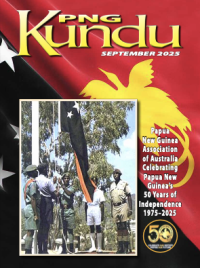53. First Congress of the Public Service Association (PSA), 1955 – Part One
Paul Quinlivan’s Snapshots
The conference was held in Port Moresby on Saturday 26 and Sunday 27 November 1955 and it was one of the most important events in TPNG history. Since 200 copies of the transcript were distributed, researchers should have no difficulty finding a copy but, now that nearly 50 years have passed, matters which would have been understood at the time require an explanation. A good place to start is at paragraph 52 where Stan Pearsall (joined 15 May 1946 and PSA Vice-President) says that meetings were what the Association had always hoped for but ‘funds would not run to this sort of expense. However, for some reason or other, the Administrator . . . agreed to pay the fares of delegates to Moresby and so made it possible’.
The background is that the PSA had, for some years, been pressing Canberra for a number of improvements but it was getting nowhere. Then, after friends put pressure on the Prime Minister, one of Australia’s most highly regarded Conciliation Commissioners, a Mr Chambers, was appointed and his Report recommended practically everything the PSA had asked for. The Minister then appointed a committee consisting of Messrs Lambert and Archer of his Department and Messrs Huxley and Wilson of the Territory to consider the Chambers Report and it was rejected. This meant that the PSA had to go to arbitration and a Mr Wood was appointed. He held hearings and printed and published his Findings and set out for the airport to return to Australia.
Because it was the proper thing to do the Executive of the PSA went to farewell him and everything was very civilised until Mr Wood said that he ‘supposed’ they were disappointed. This opened the floodgates and they told him that he had ‘found’ that single officers lived in hostels on outstations despite the evidence that hostels existed at only three main centres and there were over a hundred outstations where most single officers lived. Mr Wood said he would alter his decision on that part of the claim when he got to Canberra! They explained, in detail, how several other ‘findings’ went completely against the evidence and, each time they did it, Mr Wood said he would alter the ‘finding’ when he got to Canberra. This was astonishing enough but he then went on to say something which was generally regarded as being an admission that he had taken instructions from the Opposition and this caused outrage. I was on circuit during all of this so I don’t really know what his precise words were in this part of the conversation (I have summarised the transcript for the above) but, putting it at its least horrendous, it was probably this: in answer to the PSA saying he could not alter his ‘findings’ he said ‘I can. Now that I’ve done what they said they wanted, they can’t refuse what I’m going to ask for now.’ But whatever the words, the outrage was immediate, and Territory-wide!
It became so great that there was talk of a general strike, not only of public servants but by people in private enterprise who relied, in one way or another, on Canberra’s decisions being made ‘without fear or favour’. To put a stop to the wild talk the PSA Executive telegraphed all outstations asking them to nominate a resident in Moresby to speak on their behalf at a conference it would call. It was a good idea but there was one fatal flaw. And it speaks volumes about the all-embracing nature of Supreme Court circuits – and the lack of visits by other Departments – that people on many outstations did not know a Moresby resident! Ruri Brennan, the president of the PSA told me that one outstation had even nominated me to be their representative! I felt deeply honoured so I accepted. But when, some days later, he said that six other outstations had done the same – and the replies were still only a trickle but rising – it was obvious that this was not the way to go. And so he saw the Administrator and explained that we would be making headlines throughout the world if some other solution was not found. So the Administrator said he would fund the conference but, instead of each outstation sending a rep., they would have to elect one from each District and he would pay the fares. So I was asked if I would produce the transcript of proceedings and, when I said ‘yes’, I was made Observer and given the title ‘future editor of the PSA Bulletin’.


